


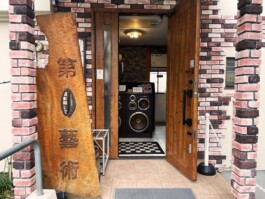
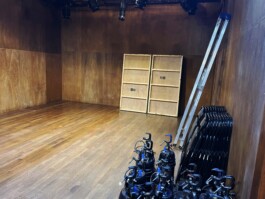
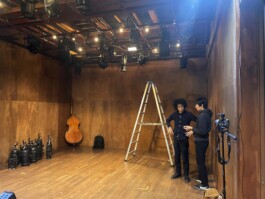
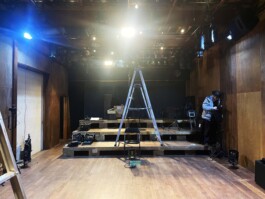
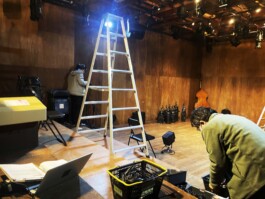
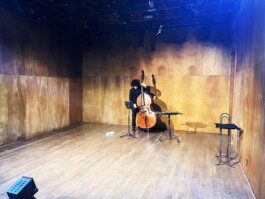
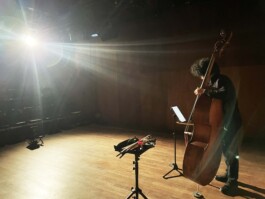
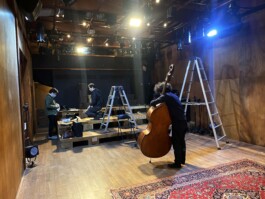
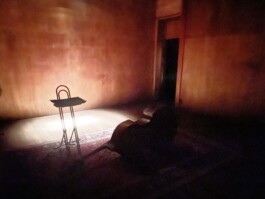
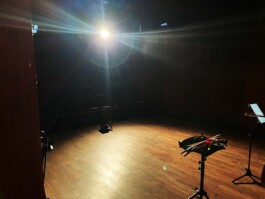
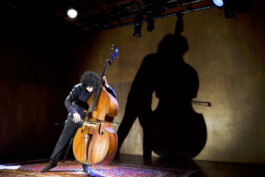
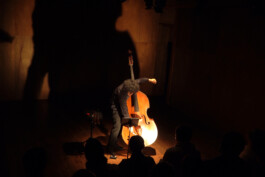
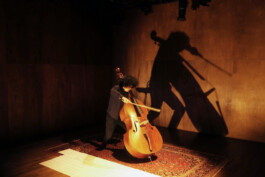
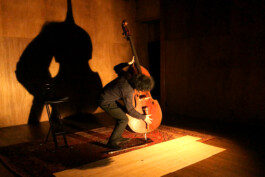
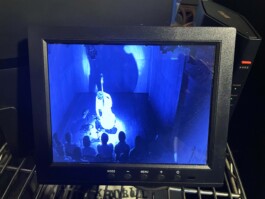
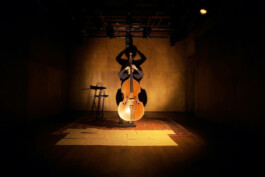
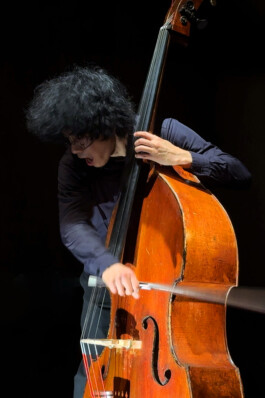
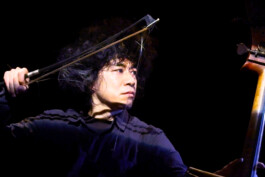
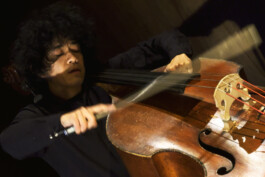
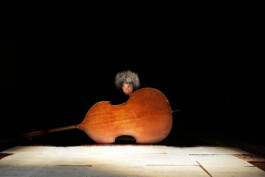
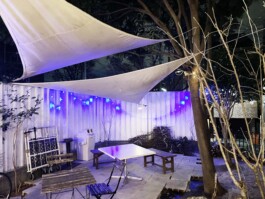
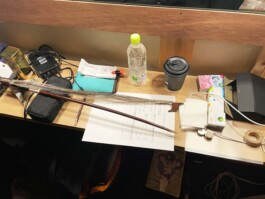
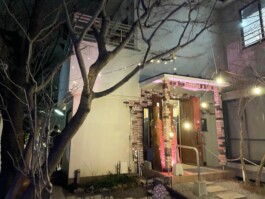
Masashi Yamamoto Contrabass Solo
The Unplugged Theatre
2024
1.26 1.27 1.28
at
1/26 (fri) 19h
&
1/27 (sat) 15h
Philippe Boivin:ZAB ou la Passion selon Saint-Nectaire (1981)※Japan Premiere
Yasunoshin Morita:Impromputu No.3 (commissioned by Masashi Yamamoto・2021)※World Premiere
Masamichi Kinoshita:piling up stones IX (commissioned by Masashi Yamamoto・2023)※World Premiere
John Cage:The Wonderful Widow of Eighteen Springs (1942)
Jacob Druckman:Valentine (1969)
Tochi Ichiyanagi:Generation of Space (1985)
1/26 (金) 19時
&
1/27 (土) 15時
フィリップ・ボアヴァン:ZAB ou la Passion selon Saint-Nectaire (1981)※日本初演
森田泰之進:速驚曲第3番 (山本昌史委嘱新作・2021)※初演
木下正道:石をつむ IX (山本昌史委嘱新作・2023)※初演
ジョン・ケージ:The Wonderful Widow of Eighteen Springs (1942)
ジェイコブ・ドラックマン:ヴァレンタイン (1969)
一柳慧:空間の生成 (溝入敬三委嘱作品・1985)
[:]
1/27 (sat) 19h
&
1/28 (sun) 15h
Philippe Boivin:ZAB ou la Passion selon Saint-Nectaire (1981)※Japan Premiere
Yasunoshin Morita:Impromputu No.3 (commissioned by Masashi Yamamoto・2021)※World Premiere
Masamichi Kinoshita:piling up stones IX (commissioned by Masashi Yamamoto・2023)※World Premiere
Dai Fujikura:Bis (2018)
Yann Robin:Myst (2019) ※Japan Premiere
Hinako Takagi:Lost in____ VI commissioned by Masashi Yamamoto・2022)
1/27 (土) 19時
&
1/28 (日) 15時
フィリップ・ボアヴァン:ZAB ou la Passion selon Saint-Nectaire (1981)※日本初演
森田泰之進:速驚曲第3番 (山本昌史委嘱新作・2021)※初演
木下正道:石をつむ IX (山本昌史委嘱新作・2023)※初演
藤倉大:Bis (2018)
ヤン・ロバン:Myst (2019) ※日本初演
高木日向子:Lost in____ VI (山本昌史委嘱作品・2022)
[:]
How far can I go and what can I do with a double bass?
This performance will explore the essence of the double bass solo, with unaccompanied works that bring out the full potential of the double bass, and masterpieces that require challenging and varied expressive skills and performance techniques.
The distance where even the sound of breathing can be heard
The venue, Atelier Q Geijutsu, is an experimental and free space that transmits a variety of expressive arts. The many contemporary works that make the most of the characteristics of the instrument, together with the lighting direction of Seiji Hayakawa, chief director of Atelier Q Geijutsu, will make for an unprecedented three days of music.
World premiere of a new work commissioned to Japanese composers
While I made it its mission to revive and pass on works that are rarely performed again, in recent years I have also actively commissioned new works from Japanese and overseas composers in order to present the appeal of the double bass in a new way.
In this performance, I will present the world premieres of two highly original works commissioned from up-and-coming composers with strong personalities.
コントラバス一本でどこまでやれるか、何ができるか
本公演は、コントラバス独奏の真髄に迫り、コントラバスの可能性を余すところなく引き出す無伴奏作品、挑戦的かつ多彩な表現力と演奏技術を要する傑作が揃う。
息づかいまで聞こえる距離感
会場となる『アトリエ第Q藝術』は、多様な表現芸術を発信する実験的で自由な空間である。コントラバスという楽器の特徴を最大限に生かした現代作品の数々に、第Q藝術チーフディレクター・早川誠司氏の照明演出も加わり、前代未聞の三日間となることだろう。
日本人作曲家による委嘱新作を世界初演
再演が少ない作品の復活と継承を自らの使命と課す一方、近年は新たなコントラバスの魅力を発信するため、国内外の作曲家への委嘱も積極的に行っている。
本公演では、強烈な個性を放つ気鋭の作曲家に委嘱した、創意あふれる2作品を世界初演する。
Masamichi KINOSHITA
木下正道
Born 1969, Ono, Fukui. After experience in brass bands and hard rock, studied music at Tokyo Gakugei University. He was selected for the Toru Takemitsu Composition Award and other prizes. Currently, his activities are based on three pillars: compositions commissioned by or jointly organised with various groups and individuals, organising radical concerts with the cooperation of outstanding performers, and improvisation using electrical equipment used in unusual ways.
In recent years, they have composed and premiered around 20 pieces a year, mainly chamber music. Most of the cutting-edge performers active in Japan who are interested in contemporary music have premiered and performed their works.
1969年、福井県大野市生まれ。ブラスバンドやハードロックの経験の後、東京学芸大学にて音楽を学ぶ。武満徹作曲賞などに入選。現在は、様々な団体や個人からの委嘱や共同企画による作曲、優れた演奏家の協力のもとでの先鋭的な演奏会の企画、通常とは異なる方法で使用する電気機器による即興演奏、の三つの柱で活動を展開する。
ここ数年は室内楽曲を中心として年間20曲程度を作曲、初演。日本で活動する現代音楽に関心を寄せる先鋭的な演奏家の殆どが、その作品を初演、再演している。
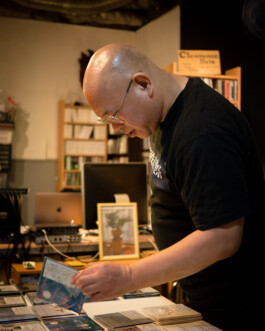
Yasunoshin MORITA
森田泰之進
Studied composition under Yoriko Matsudaira and Frédéric Durieux. He has received numerous awards, including the Japan Contemporary Music Society Composition Newcomer Award and the Valentino Bucchi Prize (Italy); selected for the 2013 and 2023 ISCM World Music Days (Vienna, South Africa); invited composer for the 2017 ISCM World Music Days (Vancouvat). Director of the Japan Contemporary Music Association.
作曲を松平頼暁、Frédéric Durieuxの各氏に師事。これまでに日本現代音楽協会作曲新人賞、ヴァレンティノ・ブッキ賞(イタリア)など受賞多数。2013、2023年ISCM世界音楽の日々(ウイーン、南アフリカ)入選、2017年ISCM世界音楽の日々(ヴァンクーヴァー)招待作曲家。 日本現代音楽協会理事。
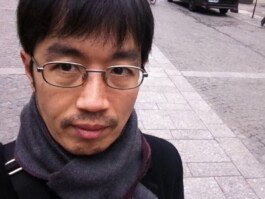
Japanese premiere of an eccentric foreign work
『ZAB』Philippe Boivin(1981)
A theatrical problem piece that is unique among contemporary works with a variety of ideas. Due to its difficulty, this work has only been performed by two performers in the past. The special techniques and theatrical performances scattered throughout the piece were highly praised by the composer himself in the summer of 2023 in the south of France.
『Myst』Yann Robin(2019)
A ‘monster’ created by the double bass. It radically overturns the double bass, or stringed instrument playing. Is there a fine line between too much destruction and too much beauty? In Darmstadt, I was taught by the premiere performers every detail of expression that cannot be read from the score.
All of them demonstrate a meticulous ability to reproduce the music, and the time has finally come for the first performance in Japan.
Rubbing, singing, playing, talking, strumming, moaning the double bass...
Extremely stimulating and unpredictable works, completed only by the double bass and performers.
Please come and experience what Masashi Yamamoto, who captures contemporary works with an original approach, will perform at the venue.
エキセントリックな海外作品を日本初演
『ZAB』フィリップ・ボアヴァン(1981)
様々なアイデアを持った現代作品の中でも、ひときわ異彩を放つシアトリカルな問題作。その難易度ゆえに演奏者は過去2人だけというこの作品。全編に散りばめられた特殊奏法と演劇的パフォーマンスは、2023年夏、南フランスにて作曲家本人より絶賛を受ける。
『Myst』ヤン・ロバン(2019)
コントラバスが創り出す“モンスター”。コントラバス、あるいは弦楽器の演奏を根本から覆す。破壊しすぎた音色は美しすぎる音と紙一重?ダルムシュタットにて、初演者より、楽譜からは読み取ることの叶わない表現の細部まで伝授される。
いずれも緻密な再現力を発揮し、いよいよ日本初演のときを迎える。
コントラバスを 擦り、歌い、弾き、語り、叩き、呻く…
コントラバスと演奏者だけで完結する、非常に刺激的で予測不能な作品たち。
独創的なアプローチで現代作品を捉える山本昌史がどんなパフォーマンスを見せるのか、ぜひ会場で体感してほしい。
『The Wonderful Widow of 18 Springs』John Cage (1942)
Song of just under three minutes. Accompanied by piano, but treated as <percussion>, which is softly tapped with fingers or fists with the lid closed. In this performance, the double bass is played as <percussion>.
『The Wonderful Widow of 18 Springs』John Cage (1942)
3分弱の歌曲。伴奏はピアノだが、蓋を閉めたまま指や拳で柔らかく叩かれる<打楽器>として扱われている。本公演では、コントラバスを<打楽器>として演奏する。
『Valentine』Jacob Druckman (1969)
A contemporary work for solo double bass, probably the most performed work in the world since its premiere in 1969. The performer strikes the instrument's body, pieces and strings with the bow, both hands and timpani sticks, producing a variety of beats and tones. There is line reading, exclamations and also sung counterpoint. ‘Valentine begins with great intensity and moves towards a state of euphoria.’ The performers must attack their instruments with an almost Marquis de Sade-like concentration.’ (from the beginning of the score)
『ヴァレンタイン』ジェイコブ・ドラックマン (1969)
1969年に初演されて以来、世界中で最も演奏回数が多いと思われる独奏コントラバスのための現代作品。演奏者は弓、両方の手、ティンパニのスティックで楽器胴体、駒、弦を叩き、多彩なビートと音色が生み出される。セリフを読んだり、絶叫したり、また、歌による対位法もある。 「ヴァレンタインは強烈な勢いで始まり、陶酔状態に向かって進む。演奏者は、ほぼマルキ・ド・ サドのような集中力で、楽器を攻撃しなくてはならない。」(スコア冒頭より)
『ZAB ou la passion selon saint nectaire...』Philippe Boivin (1981) ※Japan Premiere
The players do not simply play the instrument, but use every movement of handling the instrument, their voice and even their breath, giving the double bass a role that is more than that of an instrument. Because of its difficulty, only two players have performed it in the past. For decades, it existed as a buried masterpiece. Boivin also studied electronic music with Xenakis and others in the early days of IRCAM, and ZAB, written during that period, is a completely acoustic work that is truly challenging and experimental. In order to revive this work, we visited the composer this summer to reconsider it together.
As of 2023, new works are being created one after another, but it is also a new challenge to uncover works that have been unknown until now, by exploring, unravelling and revealing buried works that have not been performed very often. The year of composition is 1981, but even today, more than 40 years later, this work still feels new. I am very much looking forward to seeing the quirky ideas and techniques further refined and presented.
『ZAB ou la passion selon saint nectaire...』Philippe Boivin (1981) ※日本初演
演奏者は単に楽器を奏でるのではなく、楽器を扱う一つ一つの動作や声や息づかいまでも用い、コントラバスに楽器以上の役割を与える。その難易度から過去演奏した奏者は2人だけ。何十年もの間、埋もれた 名作として存在していた。 ボアヴァンはIRCAM創設初期にクセナキスらと電子音楽の研究もしており、その時期に書かれた『ZAB』 は完全にアコースティックであるが、実に挑戦的で実験的な作品となっている。この作品を復活させるべく、 今年の夏、作曲者の元を訪ね、ともに再検証を図った。
2023年現在、次々と新たな新作がこの世に生み出されているが、なかなか演奏されない埋もれた作品 を探り出し、解き明かし、つまびらかにすることで、今まで誰も知らなかった作品を明らかにすることもまた、 新たな挑戦と言えるのではないだろうか。 作曲年こそ1981年となっているが、40年以上経った現代においてもこの作品には新しさしか感じない。 その奇抜なアイデアと奏法に更に磨きをかけ、披露できることが非常に楽しみである。
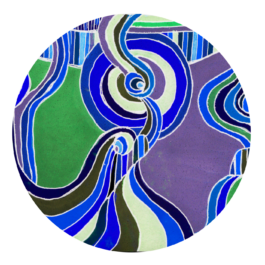
Philippe Boivin
Born 1954. Studied musicology at the Sorbonne, harmony at the Conservatoire National Supérieur de Musique de Paris and composition with Max Deutsch; awarded the SACEM prize for best educational work in 1985 and the Georges Enesco Composition Prize in 1988; studied new music with Iannis Xenakis from 1979; studied at IRCAM and He also studied at the University of California, San Diego, and later worked as a producer for Radio France.
He has written numerous works for a variety of instruments, ranging from solo pieces, chamber music and large orchestras.
フィリップ・ボアヴァン
1954年生まれ。ソルボンヌ大学で音楽学を、パリ国立高等音楽院で和声を、マックス・ドイチュに作曲を師事。1985年、SACEMより最優秀教育作品賞、1988年にはジョルジュ・エネスコ作曲賞を受賞。1979年からはヤニス・クセナキスとともに新しい音楽を研究。IRCAMやカリフォルニア大学サンディエゴ校でも学び、その後ラジオフランスのプロデューサーとして活躍した。
独奏曲、室内楽、大規模なオーケストラに至るまで、さまざまな楽器のための作品を数多く残している。
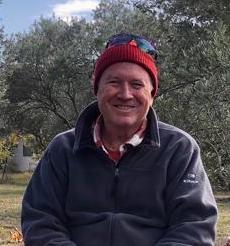
『Generation of Space』Tochi Ichiyanagi (1985)
It is written in a way that is as easy on the instrument as it is on the classical, and will be liked by those who are not interested in contemporary music. The piece begins with a slow monologue with effective use of heavy notes and harmonics, which eventually builds in density to a rhythmic section dominated by eighth notes. After a climax is built up over time, it slowly relaxes, returns to a gentle section and is finally cut off by a sharp pizzicato. After a long harmonic aftertaste, a tranquil space is left behind.
『空間の生成』一柳慧 (1985)
古典的なほど楽器に無理なく書かれており、現代音楽に興味がない人にも好まれるだろう。重音やハーモニクスを効果的に使った緩やかなモノローグから始まり、やがて密度が増してくると、8分音符を主体とした律動的な部分になる。 時間をかけてクライマックスが形成された後、ゆっくりと弛緩、緩やかな部分に戻り、最後に鋭いピッツィカートで切 られる。長いハーモニクスの余韻の後には、静謐な空間が残される。
『Bis』Dai Fujikura (2018)
Using a special tuning, the double bass is strummed like a guitar throughout the entire piece. Stringed instruments usually produce a sound by pronouncing the strings from the ‘pressing point’, but because the double bass has long strings, it can produce a loud sound even if the strings are pronounced from the ‘pressing point to the upper bridge’, in other words, on the fingerboard. This work can be said to have established a new method of playing the double bass, making good use of the pitch and acoustic difference between the ‘piece to string pressing point’ and the ‘string pressing point to upper part’.
『Bis』藤倉大 (2018)
特殊な調弦を用い、全編にわたってコントラバスをギターのようにかき鳴らす。 弦楽器は通常、「駒から押弦点」を発音させて音を出すが、コントラバスは弦長が長いため、「押弦点から上駒」すなわち、指板上を発音させても大きな音量が出る。この「駒から押弦点」「押弦点から上駒」の音程的、音響的な差を上手く利用した、コントラバスの新たな奏法を確立させた作品といえるであろう。

『Myst』Yann Robin (2019) ※Japane Premiere
After an introductory section with long, heavy tones directed down to the intervals of the shimmer, a furious storm of sound that could be described as noise begins almost throughout the piece. The left hand slams the fingerboard, the right hand slams the bow against the strings. At other times, the left hand plays Bartók pizzicato while the right hand tremolos under the bridge. All these sounds have to be completely controlled. The fierce battle between the instrument and the player, which goes on from beginning to end, comes to a quiet end with a long tone on the lowest note.
『Myst』Yann Robin (2019) ※日本初演
揺らぎの間隔まで指示された重音のロングトーンによる導入部が過ぎると、ほぼ全編にわたり、ノイズとも言える激烈な音の嵐が始まる。左手は指板を叩きつけ、右手は弓を弦に叩きつける。かと思えば左手でバルトークピッチカートをしながら、右手はブリッジ下をトレモロ。しかもすべての音は完全に制御されていなくてはならない。終始繰り広げ られる楽器と奏者との熾烈な戦いは、最低音のロングトーンとともに静かに終末を迎える。
『Lost in_____Vl 』Hinako Takagi (commissioned by Masashi Yamamoto・2022)
A composer to watch, winner of the composition category of the Geneva International Music Competition in 2019, Lost in______ is a series of solo pieces, so far composed for oboe, violin and horn. This is the sixth in the series. The inspiration for this piece came from the novel Ryutandan, written by Kyoka Izumi, a writer active from the late Meiji to early Showa periods. The piece is a natural progression that can be achieved simply by playing the score as written. Harmonics and special techniques are also used effectively.
『Lost in_____Vl 』高木日向子 (山本昌史委嘱作品・2022)
2019年にジュネーブ国際音楽コンクール作曲部門で優勝した注目の作曲家。Lost in______は独奏曲のシリーズで、今までにオーボエ、ヴァイオリン、ホルンなどのために作曲された。その第6作目となる。明治後期から昭和初期にかけて 活躍した作家、泉鏡花が書いた『竜潭譚(りゅうたんだん)』という小説が着想のきっかけとなった。楽譜通りに演奏す るだけで自然な緩急ができあがる作品。ハーモニクスや特殊奏法も効果的に書かれている。
『Impromputu No.3』Yasunoshin Morita (commissioned by Masashi Yamamoto・2021) ※World Premiere
One minute the bottle is running around on the fretboard, the next you are intoxicated by the lingering harmonics of the pitchcart, the next you are pounding out a rhythm with the mallets, and the next the bottle is running around on the fretboard again. The piece is not only surprising for its rollercoaster-like slow speed and Formula One racing speed, but also for its consistent sonority and scattered improvisations.
『速驚曲第3番』森田泰之進 (山本昌史委嘱新作・2021) ※初演
ボトルが指板を駆け回ったかと思えば、ピッチカートによるハーモニクスの余韻に酔い、マレットでリズムを叩き出したかと思えば、またボトルが指板上を駆け回る。まるでジェットコースターかのような緩急、F1レースかのような速さに驚くだけではなく、一貫性のある音律、散りばめられた即興性にも注目されたい作品である。
『piling up stones』Masamichi Kinoshita (commissioned by Masashi Yamamoto・2023) ※World Premiere
Ninth in a series of works using two tanka poems by Kenji Miyazawa. The piece will be in the form of a performance and talk. Mr Kinoshita and I have been to many of each other's concerts and have premiered several of his solo pieces. We also performed together in July this year. He is without doubt the composer who has heard me play the most. I am convinced that this will be a unique work.
『石をつむIX』木下正道 (山本昌史委嘱作品・2023) ※初演
宮沢賢治の二つの短歌を使用した作品のシリーズ第9作目。演奏しながら語るという形態になる予定である。木下氏とは何度もお互いの演奏会に行き交い、氏の独奏曲は数作品初演をさせていただいた。そして今年7月には共演も行った。 最も私の演奏を聞いている作曲家であることに間違い無いであろう。唯一無二の作品になると確信している。
Organized by Masashi Yamamoto
Supported by Tokyo University of Fine Arts Douseikai Japan Society of Contemporary Music
Grant : Arts Council Tokyo [Startup]
This concert is recommended by the Suntory Arts Foundation.
主催:山本昌史
後援:東京藝術大学同声会 特定非営利活動法人 日本現代音楽協会
助成:公益財団法人東京都歴史文化財団 アーツカウンシル東京 [スタートアップ助成]
このコンサートはサントリー芸術財団の推薦コンサートです

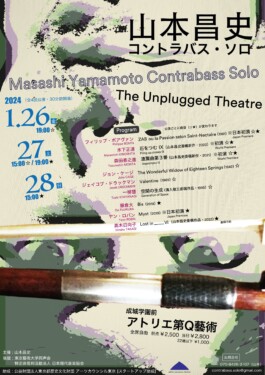
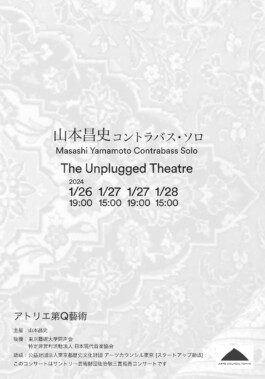
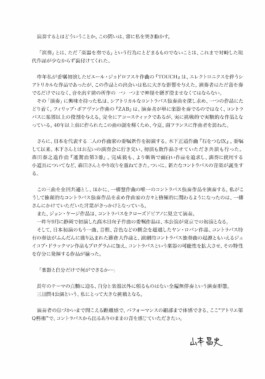
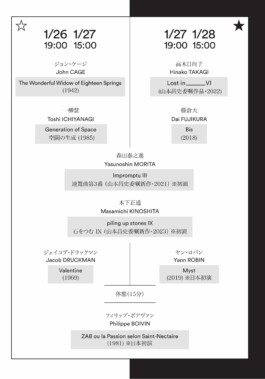
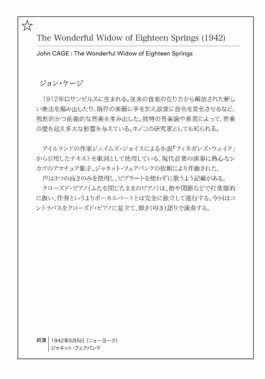
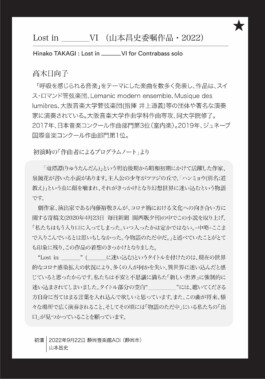
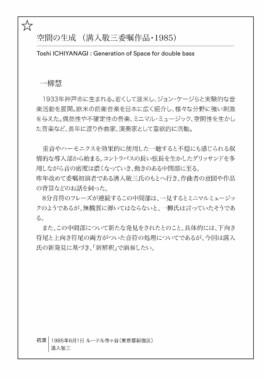
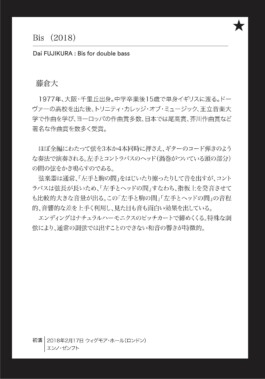
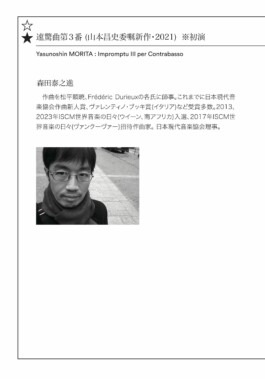
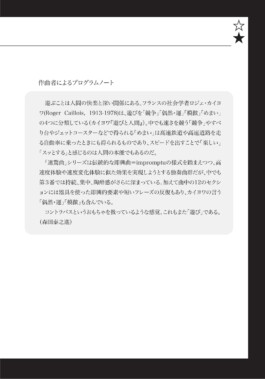
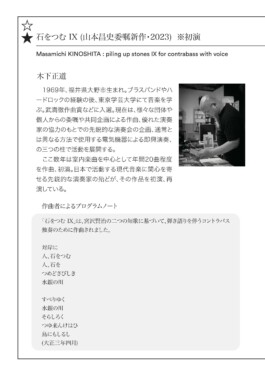
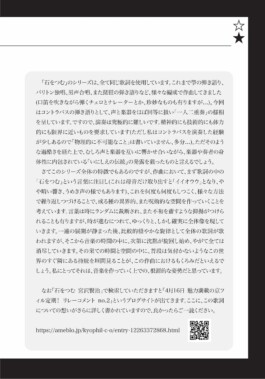
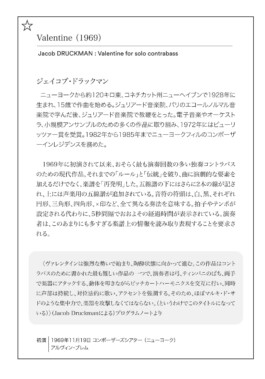
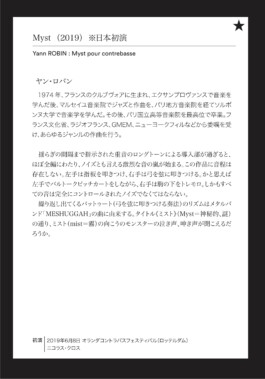
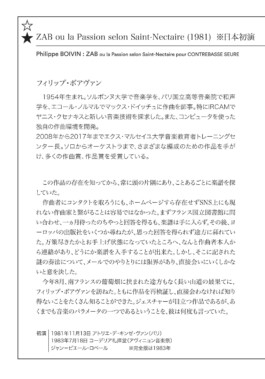
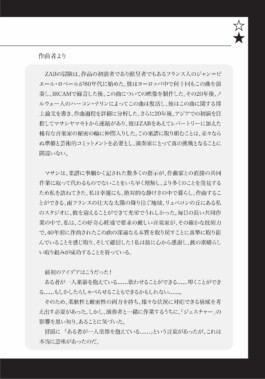
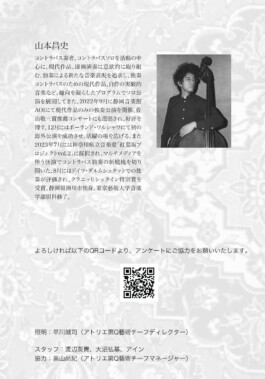
©Masashi Yamamoto 無断転載禁止
[:]